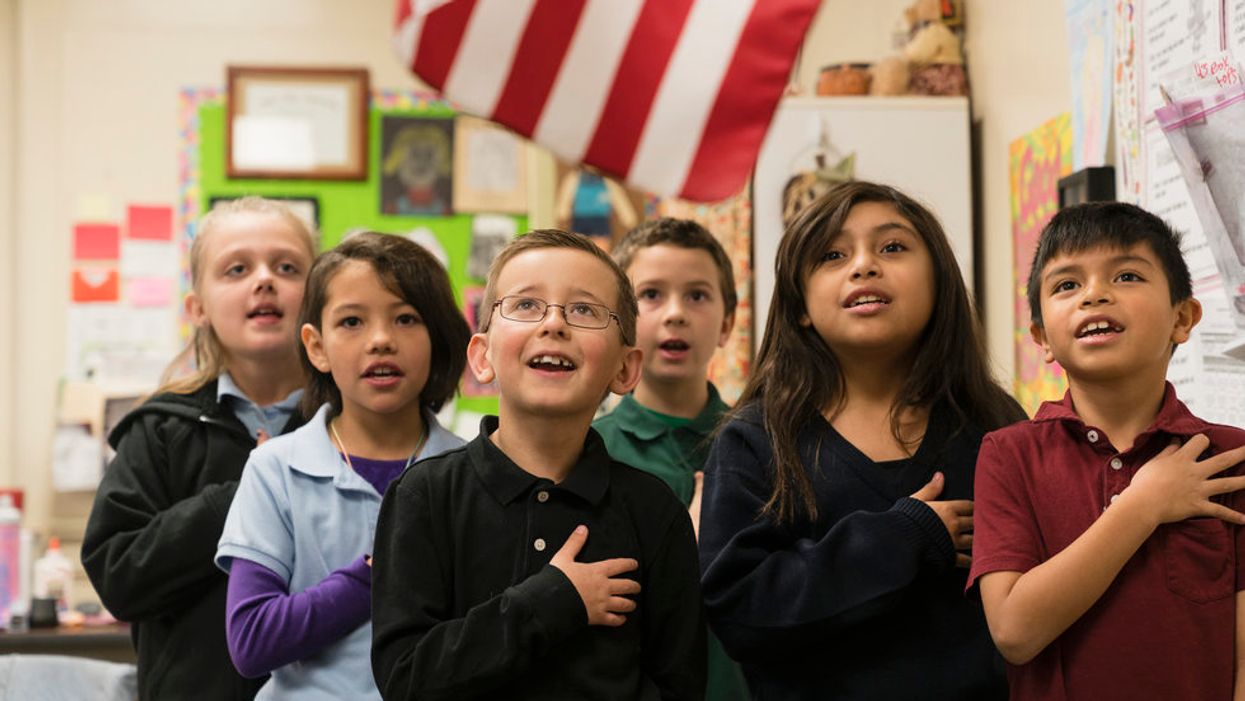Carney is a journalist and founder of The Civic Circle, a civic education nonprofit.
The movement to expand civic education has swept into state legislatures across the country, and that's both good news and bad news for civics advocates.
On the plus side, civic education mandates have brought together politicians and policy experts on both sides of the aisle. Several states, including Illinois and Massachusetts, have imposed broad new civics graduation requirements, while legislatures across the country are mulling more than 80 bills to bolster civic education.
But the civics craze has also exposed deep and lingering rifts over how to tell the American story — and just what it is that students should learn.
Civics has always challenged teachers, because it's less of a discreet discipline than it is a mashup of social studies, history, geography and lessons in civic duty. Typically, the conflict over what's properly part of a civics curriculum pits advocates of fact-based history instruction against champions of student voting and public engagement.
This is nothing new. As early as 1980, Howard Zinn wrote "A People's History of the United States" as an antidote to what he called the "fundamentalist nationalist glorification of the country." The Zinn Education Project now offers a full menu of teacher resources focused on equity and social justice, and its mission includes campaigns to abolish Columbus Day and promote classes about "climate justice."
Meanwhile, conservatives like the billionaires Charles Koch and his late brother, David, have poured big money into the $80 billion Bill of Rights Institute, a nonprofit that offers programs and resources focused heavily on primary texts, constitutional law and a free-market, libertarian doctrine. In a similar vein, Republican Gov. Ron DeSantis is pushing the Florida legislature to bring the Constitution"back" to the classroom.
But as state legislatures weigh in with new mandates, teachers are increasingly caught in the middle. And partisan tensions over civics have intensified, as they have across the board. At one extreme, some conservatives argue that harping on slavery diminishes the greatness of the American achievement. At the other, some see civic education principally as a vehicle to train the next generation of progressive activists.
Backers of civic education must tackle head-on the questions that vex teachers and administrators navigating this tricky terrain. It's not enough to argue for more funding, time and training — though those are all great starting points. Experts in the field must also help educators and policy makers update their curriculum materials, which have often failed to connect with kids, and handle the inevitable controversies.
For example: Several states have "fixed" the civics problem by requiring students to pass the U.S. citizen naturalization test in order to graduate. But rote facts learned for exams don't tend to stick with students, and the naturalization test alone is a fairly skimpy offering. New state mandates will mean little if they leave kids as clueless as ever about how to participate in democracy.
At the same time, the "lived" civics model that invites students to identify problems in their communities, then take action to fix them, can drag schools into the partisan fray. As student activism around gun safety has surged, administrators have struggled over whether to encourage or ban student walkouts. Some schools celebrate a "Black Lives Matter at School Day" to kick off Black History Month, prompting one political scientist to deplore the trend as a "grossly irresponsible" exercise in "dogmatism."
In fact, the choice between straight history and "action" civics is a false one.
Expert opinion has long coalesced around six "proven practices" for effective civic learning that combine more traditional textual studies with hands-on lessons in "living" civics. Best practices include not only classes in government, history, law, and current events, but also active student engagement in community service, school governance and simulations like mock elections and trials.
There's no reason why teachers can't instruct students on the importance of voting, and how to do it, while letting them choose their own candidates. Likewise, students can test the levers of government, including how to hold public officials accountable, and still decide for themselves what to do with those skills. One reason civic education has withered in recent decades is that teachers and administrators feared being dragged into politics. Such fears risk squelching civics yet again, even amid calls to expand it.
It's popular to tout primary sources as the best tool to let students draw their own conclusions. But one drawback of primary sources, which are now more broadly mandated by state standards, is that they tend to leave out marginalized voices, such as those of Native Americans. This has led some educators to look for new ways to fill in history's gaps, through literature or reconstructed narratives.
History will always struggle to reconcile the stories of the famous and heralded — the great men, the great wars, the great texts — with those of the powerless and often voiceless — the women, the workers, the oppressed. Teachers facing new civics mandates will need substantial help and training to make politics and government relevant to their students while dodging political crossfire.
It will be complicated, but so is American history. Those who attended the constitutional convention helped birth our nation 232 years ago this month, but their gathering in Philadelphia almost fell apart in the dispute over slavery. Civic education must teach students the full American story — the good and the bad, the written and the unwritten. It must also help students understand how to vote, speak up and hold government to account. This is neither nationalism nor partisan indoctrination. It's democracy.




















Trump & Hegseth gave Mark Kelly a huge 2028 gift